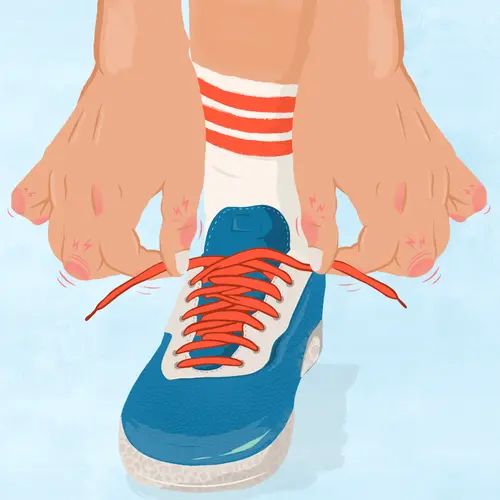Every woman is different. Some with rheumatoid arthritis find that menopause can affect their RA.
Researchers aren’t sure why, but hormones seem to play a role in RA. Nearly three times as many women get the disease as men. Many women who have it see their symptoms improve while they’re pregnant. This may be because their estrogen levels go up during pregnancy.
Estrogen levels drop around the time of menopause. When that happens, RA symptoms may worsen. Some women first get symptoms around the time they start menopause.
You might think that taking estrogen would reduce RA symptoms along with the symptoms of menopause, but that doesn't seem to be the case. And because hormone replacement therapy (HRT) is linked with heart disease -- another increased risk for women with rheumatoid arthritis - doctors rarely recommend it for treating menopause symptoms in women with RA.
Osteoporosis Risk
Rheumatoid arthritis makes osteoporosis more likely. So does menopause. Those are good reasons for women with RA to get their bone density levels checked and make sure they get enough calcium and vitamin D.
Your rheumatologist can calculate your odds of getting a bone fracture over the next 10 years by giving you a DEXA scan to measure your bone density. They’ll find the best treatment or prevention plan for you. Your doctor may recommend that you take prescription drugs to keep up your bone density and strength. Learn more about the link between RA and osteoporosis.
Sex and Intimacy
RA can sometimes make it tough to have a good sex life. On top of that, menopause can increase vaginal dryness, making sex painful. Many women with RA also have Sjögren’s syndrome, an immune system condition that attacks moisture-producing glands in the body. It can cause vaginal dryness and make sex painful. Talk to your doctor about lubricants that may help.
If you’re concerned about joint pain during sex, these ideas can help: Some positions -- like lying side by side with your partner -- can take the stress off your hips or other affected joints. You can also plan intimacy for the times of day when you usually feel less pain.
Menopause and pain can affect your desire. Your partner may also be afraid that they’ll cause you pain. It can help if both of you talk together with a doctor or counselor. Read more on how to improve your sex life with RA.
Fatigue and Depression
Menopause can make the fatigue that comes with RA worse. If you don’t get enough sleep at night or you think your RA treatment isn’t working as well as it should be, tell your doctor.
Also talk to your doctor if you feel depressed. Many people with RA have depression as well, and although it’s not a normal part of menopause, it’s something to watch out for. Psychotherapy, exercise, and antidepressants can treat depression. Get tips on how to manage RA and fatigue.
How to Feel Better
Exercise is a simple thing that helps most women with RA feel better, including women who are going through or have been through menopause.
It gives you more energy and joint flexibility, eases depression, and fights heart disease. It curbs the weight gain and insomnia that often come with menopause. Weight-bearing exercise helps protect against osteoporosis.
Your doctor or a physical therapist can work with you to create a fun, safe exercise program. Watch a video on 5 great exercises for your joints.

